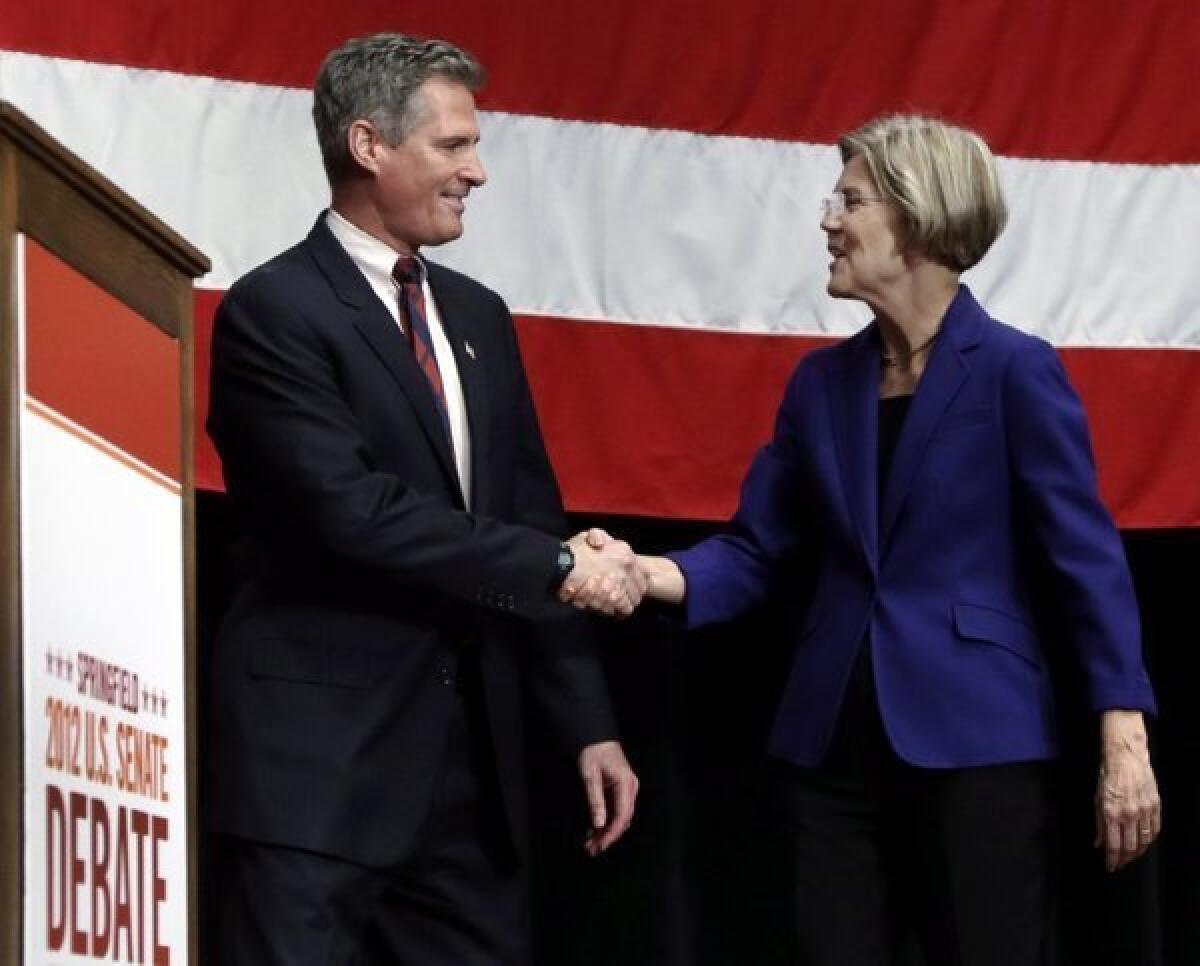Elizabeth Warren wins Senate race closely followed by Wall Street

- Share via
WASHINGTON -- Democrat Elizabeth Warren was projected to win the U.S. Senate race in Massachusetts on Tuesday night, vaulting one of Wall Street’s most outspoken critics into a position of power in the nation’s capital.
Warren defeated incumbent Sen. Scott Brown, a moderate Republican, in one of the most expensive and hotly contested Senate campaigns in the nation. Wall Street and the rest of the financial industry had pumped about $6.2 million into the race in hopes of keeping Warren out of the Senate.
With the retirement of Rep. Barney Frank (D-Mass.) this year, both architects of the Dodd-Frank financial reform law will be gone from Congress in the next session. Warren likely would become the chief defender of the law.
Brown won the seat in a stunning upset in early 2009, prevailing in a special election to succeed Democrat Edward F. Kennedy. Brown ran that race on a platform of blocking Obama’s healthcare reform legislation, which had nary a vote to spare in the Senate at the time.
Brown was unable to block the Senate from enacting the bill, but since has split often with Republicans.
In his highest profile departure, Brown was one of only three Senate Republicans to vote for the sweeping overhaul of financial regulations enacted in 2010. Brown provided the pivotal vote needed to secure its passage.
“He’s a bipartisan person. He reaches across the aisle,” Donald Andreson, a senior from Tewksbury, said at a Brown rally last month in the Boston suburb of Melrose. “He’s one of the few senators down there who do that.”
Throughout the campaign, Brown touted his bipartisanship. He often referred to a Congressional Quarterly ranking this year that he was the second-most bipartisan Republican, voting 69.6% of the time with President Obama.
And Brown often wielded his support for financial reform to blunt Warren attacks.
During a debate this month, Warren touted her work in helping launch the Consumer Financial Protection Bureau, the centerpiece of the financial reform law.
“I commend you for your work on that,” Brown said. “I voted for it. It never would have passed if I was not the deciding vote on the financial reform.”
Brown has charged that Warren would be too partisan.
Despite several votes that went against Wall Street, Brown received more contributions from the financial industry than any other congressional candidate running this fall. The money flowed into his campaign in great part because Wall Street wanted to keep Warren out of the Senate.
A Harvard law professor and longtime consumer advocate, Warren became a national figure as head of the government’s watchdog panel for the $700-billion financial industry bailout fund. She used that prominence to push for the new Consumer Financial Protection Bureau.
Warren often pointed to her role in helping create the agency, which the financial industry strongly opposed. Obama appointed her in 2010 as a special advisor to launch the agency, which began operations in mid-2011. But because of strong Republican opposition, Obama opted against nominating her to be the bureau’s first director.
Warren returned to Cambridge, Mass., and decided to run for the Senate.
Her tough talk on Wall Street -- including saying last year that she “created much of the intellectual foundation” for the Occupy movement -- led Warren to become a favorite candidate of liberals from Harvard to Hollywood.
She raised about $39.2 million for the race compared with Brown’s $29.8 million, according to the Center for Responsive Politics.
“She’s genuine. She’s honest,” Diane Lewis, 67, of Danvers said after a Warren rally last month in nearby Beverly. “She’s a brilliant woman.”
Warren linked Brown to Wall Street, saying he was more concerned about big business than average Americans.
“He’s made it clear that he stands with Wall Street,” Warren told The Times last month. “Me, I don’t want to go to Washington to work for Wall Street. I want to go to Washington to fight for working people.”
A poll in September from Suffolk University and Boston’s 7News showed that 34% of likely voters believed a vote for Brown was a vote for Wall Street, with 55% saying they did not think that was the case.
ALSO:
Warren to head launch of financial protection bureau
Massachusetts Senate race tests feelings about Wall Street
Financial firms support GOP incumbent in Mass. Senate race
Follow Jim Puzzanghera on Twitter and Google+.
More to Read
Inside the business of entertainment
The Wide Shot brings you news, analysis and insights on everything from streaming wars to production — and what it all means for the future.
You may occasionally receive promotional content from the Los Angeles Times.









